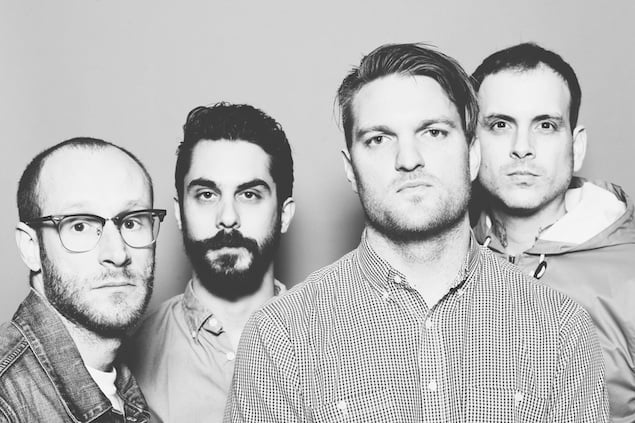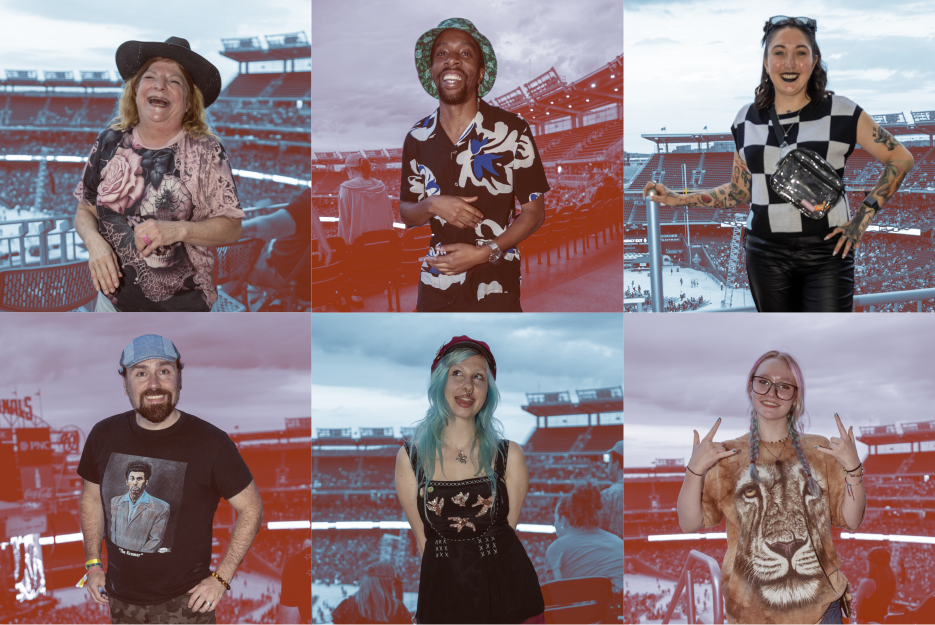Cold War Kids are not the next Kings of Leon. Yes, their last album, 2010’s
Mine Is Yours, was produced by Jacquire King, who was responsible for KoL’s massive
Only by the Night. Yes, their new album,
Dear Miss Lonelyhearts, has a bigger, more polished, arguably poppier sound, thanks in part to new guitarist/producer
Dann Gallucci (formerly of Modest Mouse). But amid the synth drums and gospel-choir
sound effects, fans of the SoCal band’s multi-layered, gritty-around-the-edges songs
will still find their signature unusual instrumentation and intelligent, achingly
poetic lyrics.
The first single, “Miracle Mile,” has been streaming since January,
and the album itself comes out Tuesday. On Wednesday the band heads out on a tour
that includes a sold-out stop at the 9:30 Club. We got frontman
Nathan Willett on the phone to talk about working with a new guitarist, pushing his creative limits,
and the conflict between attracting new ears and keeping the original fans happy.
So where are you at the moment?
I’m at home in LA. Next Tuesday the record comes out, and we’re going to be touring
then. We usually are on tour either when a record comes out or before; we like to
stay busy.
Do you ever get apprehensive before a new record comes out?
I totally do. I try to push it away, but I always have a feeling of . . . I think
it’s the thought of, “What if there too many mid-tempo songs?,” just kind of dumb
questions, questions you’re way past doing anything about. The thing about recording
that’s so strange is there is a place where you have to let things out of your hands
and just know that how it’s perceived, how it’s heard, is kind of beyond me. It’s
really hard to do that, but you have to.
You’ve played some of the new songs at shows already. What’s the reception been like?
It’s been good, especially for the song “Miracle Mile.” We’ve been playing more local
shows, Southern California shows, and people have known the words to that song, so
that’s been cool.
This album sounds like quite a departure from your other ones—it’s a bit less rock-y
and there’s a bit more of an ’80s electronic sound. Was that new vibe a conscious
decision?
We didn’t set out and have a conversation from the start, but I think one thing that
might have led to that more ’80s electronic, Depeche Mode/Bauhaus sound sneaking in—I
think on a couple of the songs we did what we normally do with them, and that’s where
Dann as the producer came in. And he and Lars [Stalfors, another producer on the album]
made changes to things, and we had to say, “Do we like this? Is this us?” It was kind
of a whole process with a lot of different factors, one where we needed to make some
choices that scared us a bit, made us ask ourselves “Why
wouldn’t we do that? Are we allowed to do that?”
Is there a song in particular that made you feel that nervousness?
Nervous isn’t quite the right way to say it—we were excited about it. “Lost That Easy”
and “Loner Phase” got that treatment the most, and that could rub some people the
wrong way who like our band for different reasons. It’s a continuation of what we
started for the last record—we’re not doing the same thing over and over again, so
we’ll see what people think about it.
When bands change their sound, people like to say they’re “selling out.” Is that ever
a concern for you—being able to evolve and grow your audience without alienating your
current fan base?
I think it applies to us. It’s something where we’ve kept ourselves under a strict
set of rules for a long time . . . [and] it’s a good thing until you get to a place
where you need to make some musical changes. And those don’t have to do with labels
or anything surrounding the band. I think indie music listeners, and people in general,
are more savvy about genres, so selling out doesn’t mean playing a certain genre or
verging from your genre, it means a clear compromise to do something that’s unlike
yourself. I don’t think we’re in breach of that any time soon.
While we’re on that topic, I was surprised to hear “Miracle Mile” on an episode of
the CW show
The Vampire Diaries, which seems like it would attract a much different audience from your typical fans.
Can you tell me how that came about?
That’s another thing that applies to the last question. They asked us to use the song,
and we’ve been a little tighter-fisted with licensing songs in the past, but the more
time that passes, the more that bands just . . . partly because it’s one of our only
ways to make money, the rules have changed on that. The Black Keys had kind of a seminal
role in seeing how many commercials you could get for one song, and that ideology
has changed to where now [the philosophy is] get people to hear the songs and seek
out the band. Obviously it does matter where it is, but it’s not as snobbish.
Speaking of changing consumers, it seems like the music scene is so single-driven
now. Does that affect the way you put together an album?
I don’t think it affects the way we write or put a record together; it affects things
in the way that we’re inevitably aware of it. Bands can get really big from one song,
and you can definitely make the argument it’s always been that way. Singles can make
a band really big, partly, but the record does matter a lot. The culture of a band
is all over the record, all over everything else you do, and that’s been the most
important thing. So while songs may stray from an original style of the band, I think
we try to make the record as a whole be attached and be cohesive.
This album was inspired by Nathanael West’s novel
Miss Lonelyhearts. Can you tell me about that?
It was loosely inspired by the book. It’s an interesting premise: The main character
is an advice columnist who works at a newspaper, and people write in and he’s going
to give them advice. Then he has this spiritual crisis because he doesn’t know how
to be really honest—and that became a fascinating thing for me. There’s a connection
between writing pop songs to encourage yourself and writing songs for other people
to tell them something. I think there’s a link to how I feel when I write songs. A
lot of the songs have advice to give, to myself or to someone else.
So when you’re writing do you start with the melody and then write the lyrics, or
vice versa?
It’s almost always some piece of music I work on, or all of us work on and flesh out;
then I add lyrics later to an existing lyrical piece. It’s funny—for the last record
I spent a lot of time writing lyrics, and I overthought it some, and kind of edited
out some of my lines that might be more abstract or weird. This time around I wanted
to keep a lot of spontaneity and leave in some of the more abstract lines that I didn’t
even quite understand. I wrote them at home in a matter of a couple of weeks while
we were working; I just wanted to do it in a way that I myself didn’t totally understand.
Was there anything really surprising to you about making this record?
I think the fact that our old guitar player, Jonnie [Russell], left and we added Dann,
and we did it all in our own studio. There were so many new things, we were looking
at each other thinking, “Is this going to work? Are we going to do something that
has a connection to who we were and also is a bold step forward?” So the whole thing
was surprising. It’s good to keep yourself in a place of a little bit of discomfort,
saying, “What’s it going to be like when we put this record out?” versus doing what
you always do.
MySpace used to be the main social media avenue for bands, and now it’s MySpace and
Facebook and Twitter and Instagram. Do you make a point to keep up with all that?
When we started out, MySpace was the thing everyone was on, and we worked hard to
make that a place that was done by us, so we had a connection there. Now we don’t
have as much involvement, but the great connecting thing we have is that our bass
player [Matt] Maust has done all the artwork [for the albums] and will continue to.
So even when you don’t micromanage all the social media, his artwork is behind it
all. And he still does so much of it; he doesn’t do everything, but there’s definitely
that cohesion there.
You guys gained an audience partially through Internet buzz. How do you find new music?
I feel like for all of us, all four of us, there’s so much talk of so much music,
it’s kind of hard to actually keep up, especially while you’re writing, because you
don’t want to be overly influenced by anything. When I was growing up, my big brother
showed me stuff, and now I obviously kind of look at what’s new, but what my friends
are into trickles down. I also listen to a lot of music, but there’re very few things
I really, really love.
What are you listening to these days?
Nick Cave—we got to see him at SXSW, and he was great. I still listen to the Frank
Ocean album a ton a year later; I really love it. There’s a Clinic album that they
put out a remix of, called
Free Reign II, which is fabulous.
Do you have a favorite city or venue to play?
We always like being in Paris and New York. I love being in DC and checking out the
Smithsonian museums. When you’re touring it’s not really about the city, it’s about
how close you are to the venue and what you can do around there.
Any plans to hit any of the big festivals this year?
Since we have the new album we kind of wanted to just do headline tour stuff, and
we’ll probably hit the big tours next summer.
Cold War Kids perform at 9:30 Club on Thursday, April 11, at 8 PM. Tickets are sold
out.
















